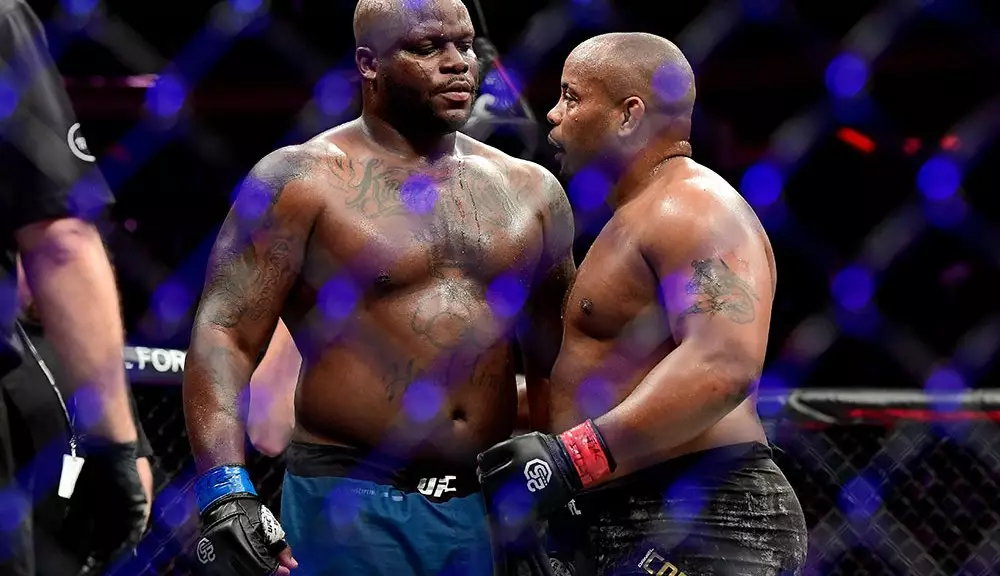In the world of mixed martial arts, rivalries often transcend the sport itself, drawing in fans and igniting debates that go far beyond the Octagon. One such rivalry is between Derrick Lewis and Daniel Cormier, two prominent figures in the UFC heavyweight division. As Lewis prepares to face Jhonata Diniz at UFC Fight Night 246 in Edmonton, Alberta, his candid remarks about Cormier have sparked renewed interest in their past interactions, particularly Lewis’s desire for a rematch. This article delves into the nuances of their rivalry, the origins of Lewis’s grievances, and the broader implications for the sport.
Derrick Lewis, known for his explosive fighting style and jovial persona, is never one to shy away from speaking his mind. His recent comments about Daniel Cormier were equal parts humorous and biting, highlighting the complexity of emotions associated with their past encounter. Lewis’s decision to call out Cormier—whom he regard as a “piece of sh*t”—is more than just a jest; it reflects a deeper sense of unresolved conflict stemming from their championship bout in 2018.
Lewis, who suffered a submission loss to Cormier in that match, appears to harbor resentment not just over the fight’s outcome but also over Cormier’s critical assessment of his performance in subsequent bouts. Lewis’s reference to Cormier’s perceived disrespect towards Popeyes chicken, a beloved establishment in Lewis’s world, adds a layer of absurdity to his critique, echoing the unique blend of humor and bitterness that often characterizes his public persona.
Conversely, Daniel Cormier, a former two-division champion and an established UFC commentator, has held a straightforward view on Lewis’s performance. Cormier has been vocal about Lewis’s declining status in the heavyweight division, indicating that he believes it might be time for Lewis to consider retirement. While Cormier maintains that his criticisms were intended to be constructive, Lewis’s reaction suggests that the message did not land as intended.
In an upcoming face-off, Cormier plans to confront Lewis about the tension between them, noting the possibility that Lewis may be harboring resentment due to prior remarks. Cormier’s acknowledgment of their somewhat amicable relationship—complicated by professional critiques—illustrates the fine line fighters walk between assessing each other as competitors and maintaining the respect intrinsic to their shared profession.
The media landscape plays a pivotal role in shaping the narratives surrounding rivalries in MMA. Interviews and press conferences serve as platforms not just for fighters to promote upcoming bouts, but also for personal grievances to surface. Lewis’s comments, widely covered and shared through social media, exemplify this phenomenon. Fans, analysts, and fighters alike engage in back-and-forth discussions, which only intensifies the rivalry.
Social media, in particular, has transformed how athletes can interact—not only with one another but also with fans and commentators. Lewis’s humorous yet biting reputation allows him to command attention, and his ability to blend entertainment with serious undertones is a powerful tool that influences public perception of both himself and Cormier.
As Derrick Lewis prepares for his fight with Diniz, it remains uncertain whether his wish for a rematch with Cormier will materialize. Given Cormier’s retirement status and current role in the UFC ecosystem, this rivalry may evolve into a different kind of engagement—one filled with nostalgic reflections rather than future confrontations.
While the Octagon may have seen its last of Lewis and Cormier clashing physically, the mental and emotional threads of their rivalry are likely to persist. Both fighters will continue to be linked in discussions of UFC history, illustrating the lasting impact of their rivalry on fans and analysts alike.
The Derrick Lewis-Daniel Cormier rivalry encapsulates the complexities and contradictions that define mixed martial arts. It serves as a reminder that beyond the physical battles within the Octagon, deeper personal narratives shape the sport’s dynamics and fan engagement in profound ways.

